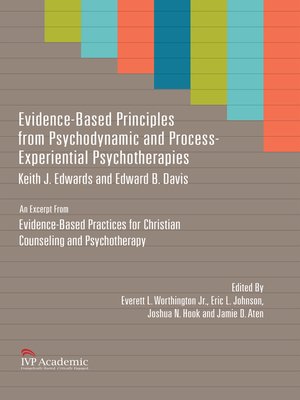Evidence-Based Principles from Psychodynamic and Process-Experiential Psychotherapies
ebook ∣ Chapter 7, Evidence-Based Practices for Christian Counseling and Psychotherapy · Christian Association for Psychological Studies
By Keith J. Edwards

Sign up to save your library
With an OverDrive account, you can save your favorite libraries for at-a-glance information about availability. Find out more about OverDrive accounts.
Find this title in Libby, the library reading app by OverDrive.



Search for a digital library with this title
Title found at these libraries:
| Loading... |
Christians engaged in the fields of psychology, psychotherapy and counseling are living in a unique moment. Over the last couple decades, these fields have grown more and more open to religious belief and religion-accommodative therapies. At the same time, Christian counselors and psychotherapists encounter pressure (for example, from insurance companies) to demonstrate that their accommodative therapies are as beneficial as secular therapies. This raises the need for evidence to support Christian practices and treatments. This essay by Keith J. Edwards and Edward B. Davis was originally published as chapter 7 in the book Evidence-Based Practices for Christian Counseling and Psychotherapy, edited by Everett L. Worthington Jr., Eric L. Johnson, Joshua N. Hook and Jamie D. Aten. Edwards and Davis provide an overview of theory and research supporting approaches to psychotherapy that are based in psychodynamic theory and practice, particularly exploring emotion and attachment within relationships with significant adults and with God. Since people develop their sense of self in relationships, those relationships can become the curative focus in psychotherapy. Although no Christian-accomodative RCTs exist at this point, the general approach is strongy supported by secular research. The chapter is particularly strong in practical advice regarding conducting this type of psychotherapy. Like the other essays in the full-length volume, Edwards's andn Davis's essay contributes to a field of inquiry that, while still in its infancy, promises to have enormous implications for future work in Christian counseling and psychotherapy.






